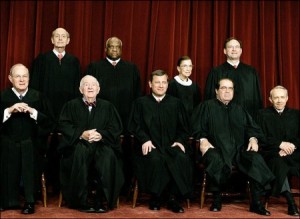Supreme Court Focus of 2008 Election
 The NYT editorial board want you to know that they’re very disappointed in the Roberts Court, particularly its upholding of Indiana’s law requiring would-be voters to be able they are who they claim to be, allowing Kentucky to continue using lethal injection for convicted murderers who’ve exhausted seventeen years of appeals, and its ruling that the 2nd Amendment applies in DC. And, while they’re pleased with the string of decisions ruling accused terrorists have rights and sparing the lives of those who rape eight-year-olds, they note that many of those decisions were 5-4.
The NYT editorial board want you to know that they’re very disappointed in the Roberts Court, particularly its upholding of Indiana’s law requiring would-be voters to be able they are who they claim to be, allowing Kentucky to continue using lethal injection for convicted murderers who’ve exhausted seventeen years of appeals, and its ruling that the 2nd Amendment applies in DC. And, while they’re pleased with the string of decisions ruling accused terrorists have rights and sparing the lives of those who rape eight-year-olds, they note that many of those decisions were 5-4.
They conclude,
The court was teetering on the brink in this term. Voters should keep that firmly in mind when they go to the polls in November.
I suspect John McCain will make exactly that case, despite disagreeing with the NYT on most of the issues at hand. It could be a persuasive argument.






There are multiple conflicts about the courts, progressives vs. conservatives being the one you hear most about. More important in my view is the conflict between doing justice and interpreting the law.
Is the marked culture of zealous advocacy that prevails in the legal profession nowadays compatible with interpreting the law? I have my doubts. What we’re seeing from both liberal and conservatives on the SCOTUS seems to me to be the former: making your decision and then finding legal justification for it.
Drawing judges from the ranks of attorneys isn’t the only way of organizing such things. In some places lawyers go to law school and judges go to judge school and, with the increasing complexity and resultant specialization of the modern world, I think we should consider reforms of this sort.